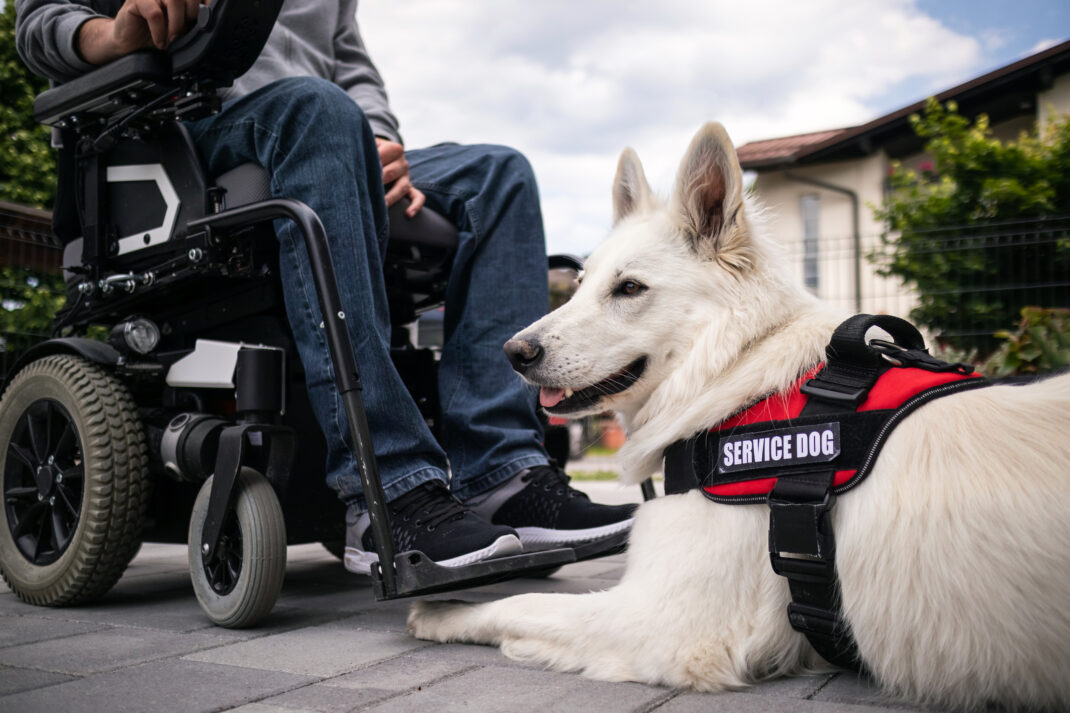
We Welcome Service Animals
Join Us in This Important Effort
Service animals enrich the lives of many disabled Americans by performing vital tasks that increase their owners’ safety, mobility and independence. These animals are not a luxury, but a necessity. By denying a disabled person with a service animal access to your business, you’re exposing yourself to lawsuits and serious penalties. So please join us in welcoming disabled guests and their service animals into your business. It’s the law. And it’s the right thing to do.
“We Welcome Service Animals” is a national campaign created by the California Hotel & Lodging Association Hospitality Foundation and made possible by funding from the American Hotel & Lodging Education Foundation and the American Express Foundation to teach people in the hospitality industry and law enforcement how to improve service to disabled guests who depend on service animals for assistance. Under the Americans with Disabilities Act (ADA), hotels, motels and restaurants are required to treat disabled customers with service animals like all other guests, providing them with the same service and access to all areas where other guests are allowed. Violating the ADA can lead to serious penalties and costly lawsuits. Also denying access to disabled people with service animals is a crime in every state.
We Welcome Service Animals Resources:
- Program Overview
- Service Animal Rules – 2017 Update
- Laws for Disabled Individuals with Service Animals (Spike’s Quiz)
- Quick Facts
In addition, videos are available online – click on the link below.
It’s the Law — and the Right Thing to Do
Congress passed the Americans with Disabilities Act (ADA) in 1990 to prevent discrimination against persons with disabilities. Among other things, the law guarantees all disabled persons the legal right to be accompanied by a service animal in all areas open to the general public. Failure to comply with the ADA exposes you and your business to lawsuits and serious federal penalties. Other state and local laws against discrimination may also exist in your area.
What is a Service Animal?
Service animals are defined as dogs that are individually trained to do work or perform tasks for people with disabilities. The task(s) performed by the dog must be directly related to the person’s disability. “Emotional Support Animal (ESA)”, “companion” and “comfort” dogs are not “service animals” protected by the ADA. (Beginning March 15, 2011, only dogs and miniature horses are recognized as service animals under titles II and III of the ADA.)
The potentially life-saving tasks they perform may include:
- Guiding individuals who are blind or who have impaired vision
- Alerting individuals who are deaf or hearing impaired to intruders or to sounds, such as fire alarms, telephones and door bells
- Pulling a wheelchair
- Providing minimal protection or rescue work
- Reminding a person with mental illness to take prescribed medications
- Calming a person with Post Traumatic Stress Disorder (PTSD) during an anxiety attack
You may not always see a service animal performing these tasks — but they’re always on the job, working to make life safer and more rewarding for their owners. Service animals can often be identified by special harnesses or colorful vests they sometimes wear — but these items are not required by law. So if you are uncertain whether an animal is a service animal, simply ask its owner.
Make All Your Guests Feel Welcome
Under the Americans with Disabilities Act:
- You must allow service animals in your hotel or restaurant — even if you have a “no pets” policy or a health code that prohibits animals in restaurants. Service animals are not pets. The ADA pre-empts health codes on this issue.
- You may not ask disabled guests to show proof of disability — even if the disability is not readily apparent to you or ask for proof that their animals are “certified” to provide assistance; this is true even if state or local laws provide to the contrary. However, you may ask what service the animal provides.
- You may not restrict disabled guests and their service animals to certain areas — such as smoking floors, “pet-friendly rooms” or restaurant smoking sections. They are allowed in all guest rooms, dining rooms and buffets, swimming pools, exercise rooms and any other place guests are normally allowed.
- You may not charge an extra fee or cleaning deposit for service animals at check-in. However, like any other guests, those with service animals are still responsible for any damage caused by them or their animal.
- You may eject a service animal that engages in excessive or prolonged barking, or is, eating food off tables, being aggressive or threatening other guests or employees — but this is highly unlikely.
- You should not touch disabled persons or their service animals without permission — it’s rude and can jeopardize the safety of both.
- You should not pet, feed or distract a service animal in any way. Remember, they’re not pets — they’re working.
- Ask disabled guests if they need assistance — don’t assume they do.
- Remember that service animals have needs too — so try to offer a safe, nearby area where they can be walked to relieve themselves.
For more information about our “We Welcome Service Animals” program, please contact CHLA at 1-916-444-5780. For information on the Americans with Disabilities Act, please contact the Department of Justice via the telephone numbers or website below.
ADA Information Line — Telephone: 1-800-514-0301 (Voice)
ADA Information Line — Telephone: 1-800-514-0301 (TTY)
Information and Technical Assistance on the Americans with Disabilities Act




















